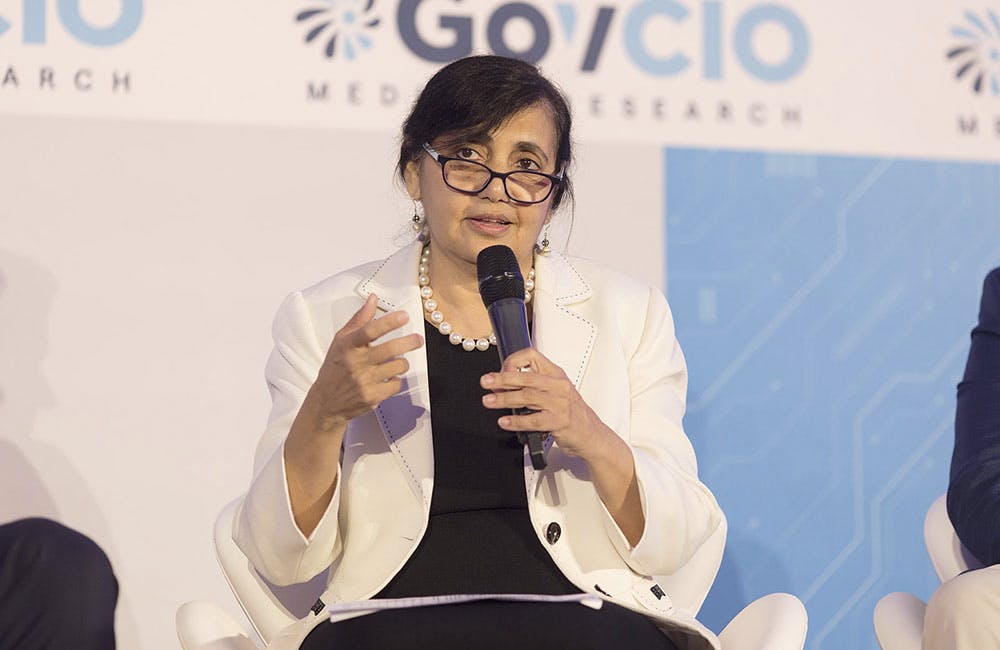MBA Program Aims for Quicker Adoption of New Tech at DHS
George Washington University’s program will focus on transitioning security technology prototypes to usable products.

Department of Homeland Security employees will soon be able to pursue a Master of Business Administration at the newest DHS Science & Technology Directorate Center of Excellence at George Washington University in Washington, D.C.
The program will “deliver a pilot Master of Business Administration program focused on security technology transition from federal research and development to operational use,” according to the press release.
The goal of the program is to level up DHS employees so they can transition prototype security technologies to usable products and services at DHS — ultimately to get ahead of emerging technologies and quickly find and adopt those that fit the DHS mission.
“With technology changing as fast as it is, there’s just no way we can keep up with the innovations that are coming out from across the country that can be applied to a DHS mission,” DHS S&T Deputy Director of the Office of Test and Evaluation Preparedness Programs Greg Simmons told GovernmentCIO Media & Research. “We recognize we probably won’t be able to buy that commodity, so we’re going to have to grow from within.”
DHS S&T will provide at least $5.8 million for the first three classes of students to participate in the program. While the “initial focus” is on enhancing DHS employees’ skills, the program is open to university masters students as well.
“We’re focused on DHS employees, but the agreement with GWU is public facing. You could take an MBA in security transition and be part of the cohort of DHS employees,” he said. “That cohort will be blended in with the folks who come in through GWU’s cybersecurity recruiting efforts. The hope is that GWU will market this and bring in people from industry and other agencies so there can be a blended approach.”
DHS S&T chose George Washington University for the program because of its unique connections to academia and the security technology industry.
“We received a host of proposals from [universities] across the country,” Simmons said. “What stood out for the GWU concept was they already have infrastructure and connections with private industry. They have a Center of Excellence already established, a board of advisors that works with the dean of the school of business already established. That put their proposal head and shoulders above the rest.”
Simmons hopes that once the first class of DHS employees graduates, they’ll be able to have a “direct impact” on decision-making at DHS. He hopes they will be “people that understand the challenges that industry and innovators will have with bringing that good idea from concept to reality.”
But the program is also about leading security-minded, innovative professionals to research-oriented careers at DHS. The program could help DHS S&T better compete with Silicon Valley for tech talent.
“With our connections to university-based research and this specific program, it gives S&T an opportunity to raise its profile within academia and the private industry and really transmit to the nation that we’re more than just what they might see on the nightly news,” Simmons said, “and that we’re trying to think deeply about these hard issues the country is facing. I don’t think until this year people realized there was a DHS S&T. This is another opportunity to connect to the nation’s deep thinkers and the captains of industry and do good things for homeland security.”
This is a carousel with manually rotating slides. Use Next and Previous buttons to navigate or jump to a slide with the slide dots
-

Inside DOD’s Push to Grow the Cyber Workforce Through Academia
Diba Hadi gives her first interview since becoming principal director of the DOD’s Cyber Academic Engagement Office.
15m listen -

Agencies Tackle Infrastructure Challenges to Drive AI Adoption
Federal agencies are rethinking data strategies and IT modernization to drive mission impact and operational efficiency as new presidential directives guide next steps.
5m read Partner Content -

Generative AI Demands Federal Workforce Readiness, Officials Say
NASA and DOI outline new generative AI use cases and stress that successful AI adoption depends on strong change management.
6m read -

The Next AI Wave Requires Stronger Cyber Defenses, Data Management
IT officials warn of new vulnerabilities posed by AI as agencies continue to leverage the tech to boost operational efficiency.
5m read -

Federal CIOs Push for ROI-Focused Modernization to Advance Mission Goals
CIOs focus on return on investment, data governance and application modernization to drive mission outcomes as agencies adopt new tech tools.
4m read -

Fed Efficiency Drive Includes Code-Sharing Law, Metahumans
By reusing existing code instead of rewriting it, agencies could dramatically cut costs under the soon-to-be-enacted SHARE IT Act.
5m read -

Agencies Push Data-Driven Acquisition Reforms to Boost Efficiency
New initiatives aim to increase visibility of agency spending, improve data quality and create avenues to deploy solutions across government.
5m read -

Data Transparency Essential to Government Reform, Rep. Sessions Says
Co-Chair of the Congressional DOGE Caucus Rep. Pete Sessions calls for data sharing and partnerships to reduce waste and improve efficiency.
5m read -

DOD Turns to Skills-Based Hiring to Build Next-Gen Cyber Workforce
Mark Gorak discusses DOD’s efforts to build a diverse cyber workforce, including skills-based hiring and partnerships with over 480 schools.
20m listen -

AI Foundations Driving Government Efficiency
Federal agencies are modernizing systems, managing risk and building trust to scale responsible AI and drive government efficiency.
40m watch -

Trump Executive Order Boosts HBCUs Role in Building Federal Tech Workforce
The executive order empowers HBCUs to develop tech talent pipelines and expand access to federal workforce opportunities.
3m read -

Navy Memo Maps Tech Priorities for the Future Fight
Acting CTO’s memo outlines critical investment areas, from AI and quantum to cyber and space, as part of an accelerated modernization push.
5m read
















